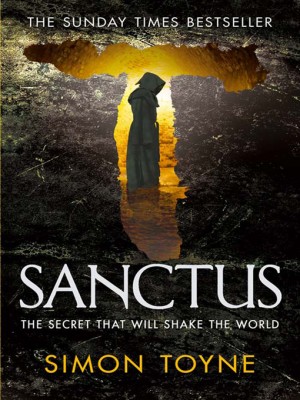
Sanctus, by Simon Toyne
With the whole world watching, a green-robed monk throws himself from the top of an ancient citadel in the center of the mountainous Turkish town of Ruin. But his death raises more questions that it could ever answer. What was he doing atop the citadel? Why did he stand for hours with his arms outstretched, mimicking the pose of Cristo Redentor in Rio de Janeiro? And above all, why did he choose to end his own life in such a macabre and public way? Was his death a terrible accident, or a symbolic gesture?
For charity worker Kathryn Mann and her family, the monk’s death is a long-awaited omen promising changes and revelations the world over. For the ancient order of fanatic monks who have lived in the citadel for thousands of years, is it a terrible betrayal that threatens to unmask their deepest, darkest secret: the identity of their holy Sacrament, long guarded against the outside world. And for New York journalist Liv Adamson, it begins a dangerous journey of body and soul, the result of which will change her life and the future of the planet.
It is impossible to discuss Simon Toyne’s debut novel Sanctus without making certain comparisons to a very famous conspiracy thriller that is seemingly loved and loathed in equal measures the world over. Superficially, Sanctus seems to resemble The Da Vinci Code in both plot and structure. For instance, the novel begins with an inexplicable death shrouded in mystery but clearly portentous of things to come. Also like The Da Vinci Code, Sanctus involves a fanatical order of disturbed monks willing to torture and murder if it means protecting their secrets. But beyond the initial set-up, the resemblances to The Da Vinci Code quickly dwindle. In fact, I found Simon Toyne’s novel to be much more enjoyable than Dan Brown’s; better written and more imaginative, despite following a fairly hackneyed set of rules for conspiracy thrillers.
Simon Toyne employs a very cinematic prose style that, for the most part, I found very appealing. Every scene is described with both precision and style; at no point did I feel that the author was wasting his words on unnecessary description nor sacrificing beautiful prose for expedience’s sake. Toyne’s writing style also lends itself extremely well to a fast-paced page-turner; every scene was packed full of action and nearly every chapter ended with a cliff-hanger that encouraged me to keep reading even when it was past my bedtime.
Overall, I feel that Sanctus’ biggest strength is balance. Toyne manages to balance an incredible amount of exposition with a fast-paced, high-action plot. Unlike Dan Brown’s novel, which predicates its story on real-world history, settings and organizations, Toyne’s novel is entirely fictional. But despite the fact that the setting and the main religious order are not real, Toyne describes everything with such authority that I actually found myself Googling “Ruin, citadel, Sacrament” because the world-building in Sanctus is so believable. Toyne injects just enough romance into the story without bogging the plot down with unnecessary tension. His characters are rich without being either caricatures or unrelatable. He drops enough plot bread-crumbs so that the reader neither becomes frustrated nor figures out the ending before he’s ready.
And let me tell you, the twist at the end is pretty strange. I did not see it coming, and I’m usually the first person to predict a surprise ending.
All in all, I enjoyed Sanctus. It certainly was not the most original nor the most erudite novel I’ve read, but the story was stimulating and I definitely found the book difficult to put down. This would make a great vacation or pool-side read.
0 Comments